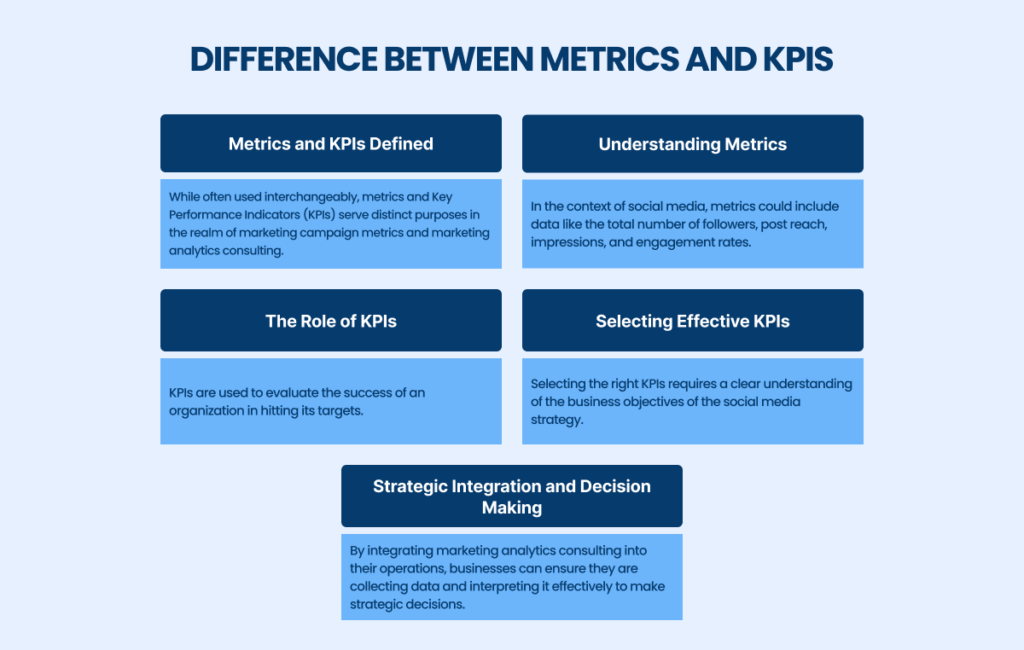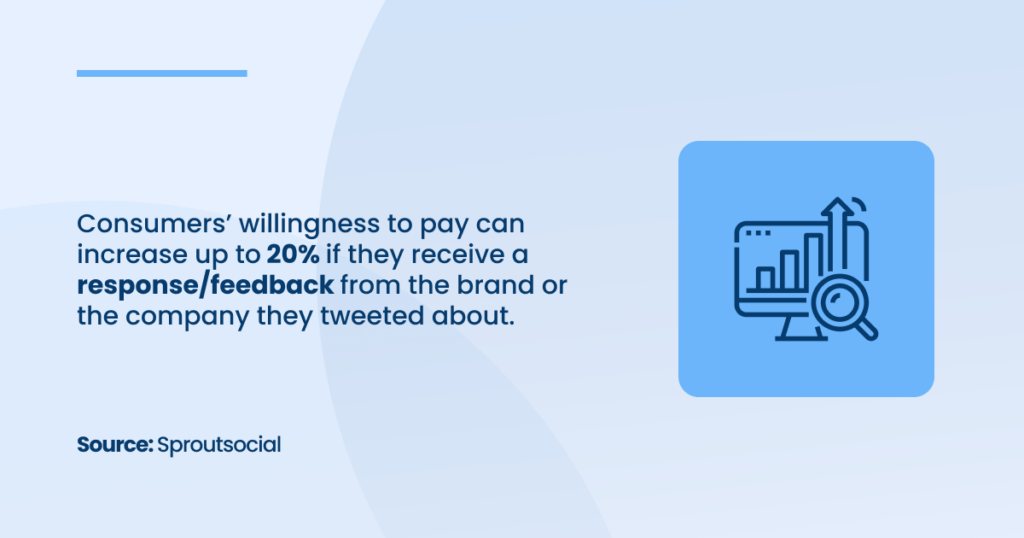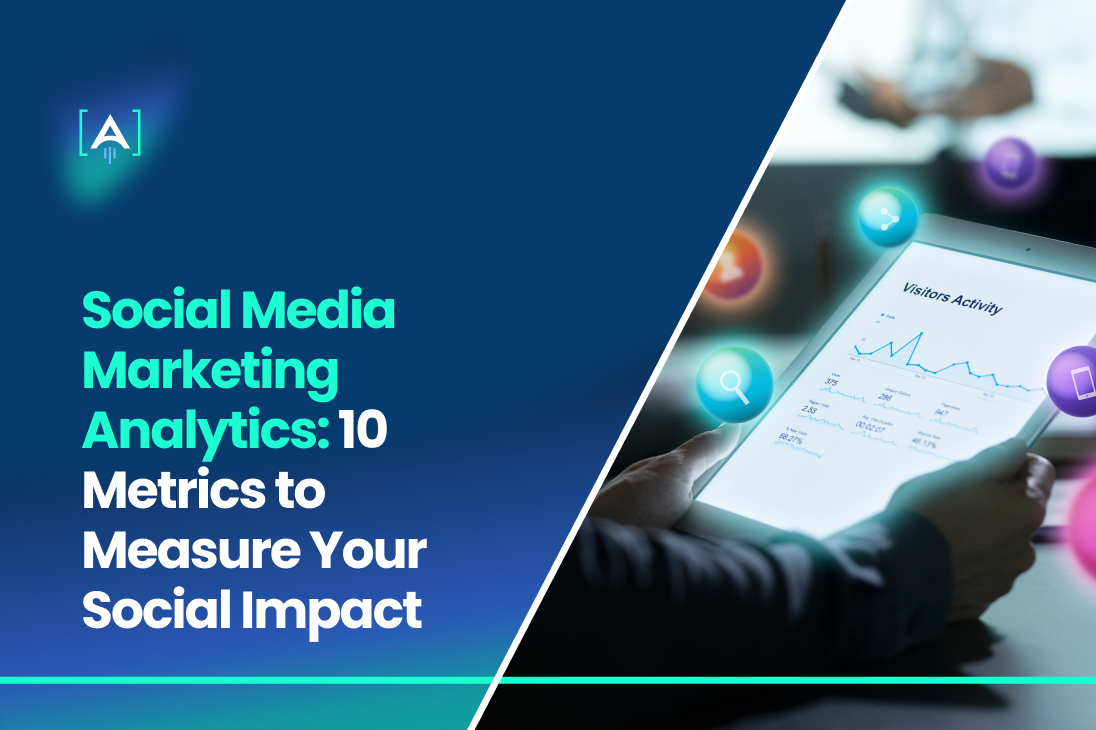Imagine a world where you can track the pulse of your brand.
Where every like, comment, and share isn’t just a number but a valuable insight into the minds of your audience. Welcome to the realm of social media marketing analytics.
In today’s digital age, social media platforms have become the bustling marketplaces of our time.
Social media usage is one of the most popular online activities. In 2024, over 5 billion people were using social media worldwide, a number projected to increase to over 6 billion in 2028.
Source: Statista
But to navigate this vibrant landscape successfully, businesses need more than just a strong presence. They need to understand how their audience interacts with their content, what resonates, and what falls flat.
This is where the expertise of a Marketing Analytics & Reporting Agency becomes invaluable to provide insights into user behavior, content performance, and campaign effectiveness.
The blog post will cover social media marketing analytics and its 10 key metrics for measuring social impact.
The Importance of Analytics in Social Media Marketing
In today’s digital age, the importance of analytics in social media marketing cannot be overstated.
With millions of users and countless interactions taking place across various platforms every day, social media offers a goldmine of data.
Source: Most popular social networks worldwide as of April 2024, Statista
Harnessing this data through social media marketing analytics is crucial for businesses aiming to enhance their online presence and engage effectively with their audience.
Social media marketing analytics involves the process of collecting, analyzing, and interpreting data from social platforms to make informed marketing decisions. The insights gained can transform a standard social media strategy into a powerful tool for market dominance.
By analyzing the patterns and trends in the data collected, businesses can understand the preferences and behaviors of their target audience, optimize their content, and improve the overall effectiveness of their social media campaigns.
The strategic use of analytics in social media marketing also allows companies to measure the success of their marketing efforts in real-time.
Understanding Social Media Metrics
Understanding social media metrics is essential for any marketer aiming to assess and refine their social media strategy effectively. Metrics provide tangible evidence of how social media activities influence audience behavior and business outcomes.
They are the backbone of social media performance monitoring and are pivotal in determining the ROI of social media marketing efforts.
Some of the primary social media metrics that marketers should focus on include engagement rates (likes, comments, shares), reach, impressions, follower growth, and click-through rates (CTR).
These metrics help paint a clear picture of how content is performing and how users are interacting with it. For instance, a high engagement rate generally indicates that content is resonating well with the audience, prompting them to interact with it.
Utilizing social media analytics tools is crucial in this process. These tools not only track and report these metrics but also provide deeper insights into audience demographics, peak activity times, and consumer behavior patterns.
This information is vital for optimizing social media campaigns and aligning them more closely with the audience’s preferences.
The Difference Between Metrics and KPIs
Understanding the key components involved in social media analytics is crucial for optimizing marketing strategies and achieving desired business outcomes.

Key Metrics to Track Your Social Media Impact
Understanding the right metrics to track is crucial for evaluating the success of your social media efforts and making data-driven decisions to enhance your strategy.
1. Engagement Metrics
Engagement metrics are critical indicators of how actively your audience is involved with your content.
High engagement rates are typically signs of compelling content that resonates with your audience, making these metrics essential components of analytics in social media marketing.
Likes, Comments, and Shares
Likes, comments, and shares are the most direct and measurable forms of engagement on most social media platforms. Tracking these metrics gives you a clear view of how appealing your posts are to your audience.
Source: Daily time spent on social networking by internet users worldwide from 2012 to 2024, Statista
In terms of social media marketing analytics, these actions can be aggregated to understand trends in content performance over time, helping to refine what types of posts generate the most interaction.
Engagement Rate
Engagement rate is a key performance indicator that measures the percentage of your audience that interacts with your content. It is calculated by dividing the total number of engagements by the number of impressions or reaches, then multiplying by 100 to get a percentage.
High engagement rates often indicate that your content is resonating well with your target audience, which is a critical insight in marketing analytics solutions.
2. Reach and Impressions
Reach and impressions measure how far your content is spreading and how many times it is seen. These metrics are crucial for understanding the scale and effectiveness of your social media campaigns.
Reach vs. Impressions
Reach refers to the number of unique users who have seen your post, while impressions are the total number of times your post has been displayed, regardless of whether it was clicked or not.
The distinction between the two is vital in mobile and web marketing analytics as it helps marketers understand how many people are being exposed to their brand and how often their content is consumed.
Why They Matter
Both metrics are crucial for business data analytics as they provide insights into brand awareness and content visibility.
High reach can lead to increased brand awareness, while high impressions can indicate that content is engaging enough to be viewed multiple times. Understanding these metrics can help adjust strategies to maximize content visibility and effectiveness.
3. Follower Growth
Follower growth is a fundamental metric that indicates the health and potential of your brand’s social media presence. It reflects your brand’s ability to attract new audiences and can be an indicator of brand loyalty in the long term.
Tracking New Followers
Monitoring the rate of new followers over time can provide insights into how effective your social media efforts are at attracting new audiences.
Social media analytics tools offer detailed reports that help you understand which campaigns or content pieces drive the most follower growth. This insight is integral to influencer and AI marketing analytics, where understanding audience growth patterns can directly influence future campaigns.
Analyzing Follower Drop-offs
Analyzing why followers choose to unfollow or disengage can provide crucial feedback for your content strategy and overall brand messaging.
Marketing analytics services can dissect your social media data to reveal patterns and triggers for follower drop-offs, allowing you to make necessary adjustments to retain your audience better.
By tracking these key metrics through a robust social media analytics tool, businesses can gain a deep understanding of their social media performance. This data is invaluable for guiding strategy adjustments and optimizing social media marketing analytics to achieve better engagement, reach, and a stronger return on investment in your social media channels.
These insights also help leverage marketing analytics solutions to align more closely with business objectives, ensuring that every social media effort contributes to your organization’s broader goals.
4. Click-Through Rate (CTR)
Click-through rate (CTR) is a vital statistic within social media marketing analytics that measures the percentage of clicks on a link compared to the number of times the advertisement or social media post was shown (impressions).
CTR serves as a direct indicator of how effectively your content encourages your audience to take a more in-depth look at what you offer.
Importance of CTR in Campaigns
In the realm of analytics in social media marketing, CTR is crucial because it directly correlates to how well your content captures interest and incites action among your audience. A high CTR means that your audience finds your ads or posts relevant and appealing enough to engage further.
This metric is particularly important in mobile marketing analytics and web marketing analytics, where user interaction behaviors can significantly differ depending on the platform. AI marketing analytics can further enhance the understanding of CTR by predicting and analyzing patterns in user engagement, allowing businesses to tailor their campaigns more effectively.
Tracking CTR is also essential in SEO marketing analytics, where the effectiveness of keyword placements and content relevance can profoundly impact click-through rates.
5. Conversion Rate
Conversion rate is another critical metric in social media marketing analytics that measures the percentage of users who take a desired action divided by the total number of clicks on a given post or advertisement.
This action could range from signing up for a newsletter to purchasing a product.
Converting Social Media Traffic to Leads or Sales
The ultimate goal of most social media campaigns is to convert interest into actionable results that benefit the business, be it through lead generation or direct sales. Here, marketing analytics consulting plays a significant role in deciphering which strategies work best for converting browsers into buyers.
Source: Invespcro
Influencer marketing analytics and marketing analytics services offer deeper dives into how influencer endorsements and targeted advertising can drive conversions.
Moreover, marketing analytics solutions integrate data analytics in business to track user journeys from initial contact through to sale, providing valuable insights that help refine marketing strategies and maximize conversion rates.
6. Customer Satisfaction Score (CSAT)
Customer Satisfaction Score (CSAT) is a key performance indicator used to gauge customer satisfaction with a product, service, or experience.
In social media analysis, CSAT can be particularly insightful as it helps measure the direct impact of social media interactions on customer perceptions and loyalty.
Collecting Feedback via Social Media
Social media platforms offer a unique opportunity to collect customer feedback directly and informally.
Social media marketing analytics tools can aggregate customer feedback, ratings, and reviews that occur across social channels to compute the CSAT. This feedback is invaluable as it provides businesses with marketing data insights to guide product or service improvements.

Techniques in AI marketing analytics can analyze large volumes of data from social media to detect patterns in customer sentiment, which aids in proactive customer service and product development.
Google Analytics can also be utilized to track how users interact with your social media channels and website after providing feedback, offering a holistic view of how customer interactions influence their behavior and brand loyalty.
By leveraging these metrics—CTR, conversion rate, and CSAT—businesses can optimize their social media strategies to better meet the needs of their audience.
Implementing sophisticated marketing analytics trends and tools ensures that every piece of content not only reaches the intended audience but also resonates and converts them at an optimal rate.
7. Brand Mentions
Brand mentions are a crucial metric in social media marketing analytics as they reflect how often your brand is being talked about across various social media platforms.
This metric is essential for assessing brand visibility and reputation within the digital landscape.
Monitoring Brand Mentions
Monitoring brand mentions involves tracking every instance where your brand is cited on social media, blogs, or online forums.
This process is integral to analytics in social media marketing because it helps businesses gauge public perception and the reach of their brand messaging.
AI marketing analytics and marketing analytics services can automate the detection and aggregation of these mentions, providing real-time alerts and detailed insights into the frequency and context of these mentions.
This continuous monitoring allows brands to quickly respond to customer feedback, manage crises, or capitalize on positive publicity.
Sentiment Analysis
Sentiment analysis is the process of determining the attitude or emotional tone behind brand mentions, whether positive, negative, or neutral.
This component of social media marketing analytics is powered by advanced AI marketing analytics technologies that can interpret nuances in language used in social media posts and comments.
Marketing analytics solutions that include sentiment analysis can provide deeper marketing data insights into how customers truly feel about a brand or product, guiding more informed marketing strategies and public relations responses.
8. Share of Voice
Share of Voice (SOV) measures the amount of the market conversation your brand owns relative to your competitors. It is a key metric used in social media marketing analytics to assess brand dominance and influence in the industry.
Comparing Your Social Presence with Competitors
Comparing your brand’s social presence with competitors involves analyzing the volume of mentions, the sentiment of those mentions, and engagement levels.
Marketing analytics consulting can provide a detailed comparison, highlighting strengths and weaknesses in your social media strategy relative to key competitors.
Tools used in mobile marketing analytics and web marketing analytics can segment data to show differences across various platforms, providing actionable insights that help businesses refine their social media campaigns to increase their market share.
9. Video Views
Video views are an increasingly important metric as video content continues to dominate social media.
This metric helps measure the reach and impact of video content on platforms such as YouTube, Facebook, Instagram, and TikTok.
Analyzing Viewer Engagement Through Video Metrics
Analyzing viewer engagement through video metrics includes examining not only the number of views but also watch time, likes, comments, and shares.
SEO marketing analytics play a role here by optimizing video content to ensure higher visibility and engagement.
Source: Most popular online video properties in the United States, Statista
Marketing analytics trends point towards deeper analytics into viewer behavior, such as drop-off points and replay instances, which can be crucial for enhancing content quality and viewer retention strategies.
Influencer marketing analytics can also assess how influencer-partnered video content performs in comparison to non-influencer content.
10. Social Media ROI
Social Media Return on Investment (ROI) is a critical measure that calculates the effectiveness of social media activities in terms of generating revenue relative to the cost of those activities.
Calculating ROI for Social Media Activities
Calculating ROI for social media activities involves identifying key performance indicators (KPIs) relevant to monetary goals, such as lead generation, sales, and customer acquisition costs.
Source: HubSpot
This calculation can be complex, involving data from social media analytics tools, Google Analytics, and CRM systems to track how social media efforts translate into tangible business outcomes.
Marketing analytics solutions often include integrated dashboards that correlate social media engagement metrics with sales data, providing a clear view of the financial impact of social media campaigns.
Partner with [A] Growth Agency for Your Marketing Analytics & Reporting Expertise
In the ever-evolving social media landscape, analytics serves as your indispensable compass.
By understanding the metrics that matter, you can optimize your content, engage your audience more effectively, and make data-driven decisions.
[A] Growth Agency will support you. We specialize in turning entrepreneurial dreams into reality with effective, tailored growth strategies.
We not only track marketing campaign metrics but also analyze them to ensure every decision is data-driven and strategically sound.
Remember, at [A] Growth Agency, we believe in measurable outcomes.
Let us transform your business with our tailored solutions.

